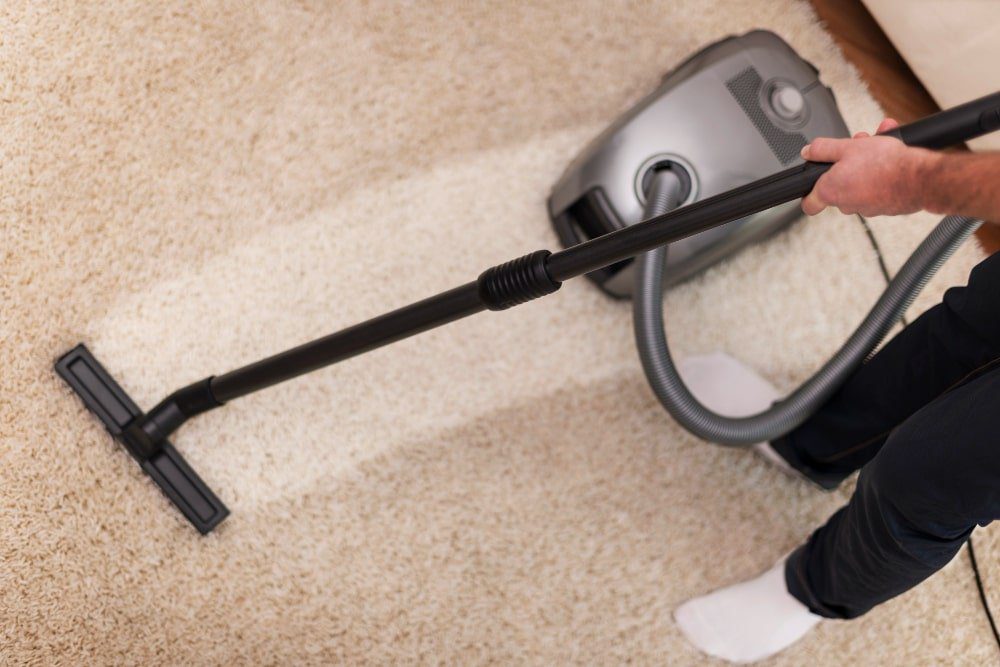Carpet cleaning is an essential chore for every homeowner. It not only enhances the aesthetics of your home but also promotes a healthier indoor environment. One popular method of maintaining clean carpets is by using carpet powder. But have you ever wondered if this common cleaning agent is actually detrimental to your trusty vacuum cleaner? In this comprehensive guide, we delve into the world of carpet powder, its purpose,find the answer “is carpet powder bad for your vacuum“, and how to ensure your cleaning routine is as effective as possible.
Defining Carpet Powder and Its Usage
Carpet powder is a versatile cleaning product specially formulated for carpets and rugs. Its primary purpose is to refresh and revitalize your carpets by eliminating odors, absorbing dirt, and leaving a pleasant scent behind. It’s an easy-to-use solution for in-between deep cleanings, providing a quick and convenient way to keep your carpets looking and smelling fresh.
How Carpet Powder Works
Carpet powder works through a combination of ingredients and mechanisms to refresh and revitalize your carpets. Here’s how it typically works:
Odor Absorption:
One of the primary functions of carpet powder is to absorb and neutralize odors trapped in your carpet fibers. It contains ingredients like baking soda, which are known for their odor-absorbing properties. When you sprinkle carpet powder on your carpet, it penetrates deep into the fibers and starts to absorb and neutralize unpleasant smells. This is especially useful for getting rid of pet odors, cooking smells, or other persistent scents.
Fragrance Release:
Many carpet powders also contain fragrances or essential oils. These added scents are released gradually over time as you walk on the carpet or vacuum it. This gives your home a fresh and pleasant aroma, masking any lingering odors and leaving your living space smelling clean and inviting.
Stain Removal (Some Varieties):
Some carpet powders are formulated with stain-removing agents. These agents can help lift and remove minor stains and dirt from your carpets. While they may not be as effective as professional carpet cleaning for deep stains, they can improve the overall appearance of your carpets.
Allergen Reduction:
Carpet powder can also contribute to better indoor air quality by trapping allergens like dust mites and pollen. When you vacuum the powder, it takes these allergens with it, helping to create a healthier environment, especially for allergy sufferers.
To use carpet powder effectively, you typically sprinkle it evenly over your carpet, let it sit for a specified period (usually 15-20 minutes, but this can vary by product), and then vacuum it up. During this time, the powder works its magic by absorbing odors, releasing fragrance, and, in some cases, helping to lift surface stains. After vacuuming, your carpets should not only look cleaner but also smell fresher, making your home a more pleasant place to be.
Is Carpet Powder Bad For Your Vacuum

Yes, carpet powder can potentially be bad for your vacuum cleaner if not used and maintained properly. While carpet powder serves as an effective cleaning agent for carpets, it can pose challenges to your vacuum cleaner and affect its performance in the following ways:
- Clogging: The fine particles in carpet powder can accumulate inside your vacuum cleaner’s filters and hoses, leading to clogs. These clogs obstruct airflow, reducing the vacuum’s efficiency.
- Motor Strain: Excessive use of carpet powder without regular maintenance can strain the vacuum cleaner’s motor, potentially shortening its lifespan and resulting in costly repairs.
- Reduced Suction: Clogs caused by carpet powder residue can lead to reduced suction power, making your vacuum less effective at picking up dirt and debris.
To prevent these issues, it’s important to use carpet powder in moderation and follow these best practices:
- Moderation: Use carpet powder sparingly. It’s best suited for occasional use between deep cleanings.
- Vacuum Regularly: Ensure you vacuum thoroughly after applying carpet powder to remove all residue and prevent clogs.
- Proper Application: Follow the manufacturer’s instructions for application to avoid overuse.
- Choose High-Quality Products: Invest in high-quality carpet powders that are less likely to leave residue or damage your vacuum cleaner.
By using carpet powder responsibly and maintaining your vacuum cleaner regularly, you can strike a balance between effective carpet cleaning and preserving the longevity of your vacuum cleaner.
Potential Harm to Vacuum Cleaners
While carpet powder is a handy tool in your cleaning arsenal, it can pose some challenges to your vacuum cleaner’s well-being:
- Clogging: The fine powder particles can accumulate inside your vacuum’s filters and hoses, potentially leading to clogs. This obstructs airflow and reduces your vacuum cleaner’s efficiency.
- Motor Strain: Excessive use of carpet powder without regular maintenance can strain the vacuum cleaner’s motor. This can shorten its lifespan and lead to costly repairs.
- Reduced Suction: Clogs caused by carpet powder residue can result in reduced suction power, making your vacuum less effective at picking up dirt and debris.
Impact on Carpet Maintenance
Aside from its effects on vacuum cleaners, carpet powder can also influence the overall maintenance of your carpets:
- Residue Buildup: Over time, the residue left behind by carpet powder can accumulate in your carpets. This can create a sticky film that attracts dirt, making your carpets appear dingy.
- Fading Colors: Some carpet powders contain harsh chemicals that may accelerate color fading in your carpets, especially if used excessively.
Best Practices for Using Carpet Powder
To maximize the benefits of carpet powder while minimizing potential harm to your vacuum cleaner and carpets, consider the following best practices:
- Moderation: Use carpet powder in moderation. It’s best suited for occasional use between deep cleanings.
- Vacuum Regularly: Ensure you vacuum thoroughly after applying carpet powder to remove all residue and prevent clogs.
- Proper Application: Follow the manufacturer’s instructions for application to avoid overuse.
- Choose High-Quality Products: Invest in high-quality carpet powders that are less likely to leave residue or damage your carpets.
Vacuum Cleaner Maintenance for Carpet Care
Maintaining your vacuum cleaner is essential for preserving its performance and longevity. Here are some tips:
- Regular Cleaning: Empty the vacuum’s dustbin or change the bag frequently to prevent clogs and maintain suction power.
- Filter Maintenance: Clean or replace filters as recommended by the manufacturer to ensure efficient airflow.
- Check for Clogs: Routinely inspect hoses and brushes for clogs caused by carpet powder or debris.
Choosing the Right Cleaning Products
If you’re concerned about the impact of carpet powder on your vacuum cleaner, consider alternative cleaning products for your carpets. There are various eco-friendly and carpet-friendly options available, such as:
- Dry Carpet Cleaning: This method uses minimal moisture and is less likely to leave residue or harm your vacuum cleaner.
- Steam Cleaning: Professional steam cleaning can effectively remove dirt and stains without the need for additional cleaning agents.
- Homemade Solutions: You can create DIY carpet cleaners using ingredients like vinegar and baking soda, which are gentle on both carpets and vacuum cleaners.
Indoor Air Quality Concerns
It’s essential to recognize that carpet powder can impact the air quality inside your home. While it can leave a pleasant fragrance, some individuals may be sensitive to the chemicals or fragrances used in these products. Consider these tips to maintain a healthy indoor environment:
- Ventilation: Ensure proper ventilation after using carpet powder to dissipate any lingering odors.
- Choose Hypoallergenic Products: Opt for hypoallergenic or fragrance-free carpet powders if you have allergies or sensitivities.
Removing Carpet Powder Residue
To effectively clean your vacuum cleaner after using carpet powder, follow these steps:
- Empty the Dustbin: Start by emptying the vacuum cleaner’s dustbin or changing the bag to remove any collected residue.
- Clean Filters: Clean or replace filters to restore optimal airflow and suction power.
- Inspect Hoses and Brushes: Check hoses and brushes for any remaining residue or clogs and clean them thoroughly.
Extending the Lifespan of Your Vacuum Cleaner
Prolonging the life of your vacuum cleaner is essential for efficient carpet maintenance. To achieve this, keep these insights in mind:
- Regular Maintenance: Perform routine maintenance as recommended by the manufacturer to prevent breakdowns.
- Proper Storage: Store your vacuum cleaner in a clean, dry area to avoid dust and moisture damage.
- Professional Servicing: Periodically have your vacuum cleaner serviced by a professional to address any underlying issues.
In conclusion, carpet powder can be a valuable asset in maintaining clean and fresh carpets. However, its impact on your vacuum cleaner and carpets largely depends on proper usage and maintenance. By following the best practices outlined in this guide and considering alternative cleaning solutions, you can strike a balance between effective carpet care and preserving the longevity of your vacuum cleaner.
FAQs
1. Is vacuum powder bad for vacuums?
Vacuum powder, often referred to as carpet powder or carpet freshener, can potentially have a negative impact on vacuums if used excessively. The fine particles in the powder can lead to clogs in the vacuum’s filters and hoses, reducing its suction power and efficiency. To prevent this, it’s advisable to use vacuum powder sparingly and follow the manufacturer’s recommendations.
2. Is carpet odor eliminator bad for vacuum?
Carpet odor eliminators, such as carpet powders or deodorizers, can be problematic for vacuums if not used correctly. Excessive use can lead to clogs, strain on the vacuum’s motor, and reduced suction. To avoid these issues, use carpet odor eliminators in moderation and ensure you follow proper vacuum maintenance practices.
3. Do you vacuum carpet powder?
Yes, you should vacuum carpet powder after it has been applied and allowed to sit for the recommended amount of time, typically 15-20 minutes. Vacuuming removes the powder along with the trapped odors and dirt from your carpets, leaving them fresh and clean.
4. Is carpet powder bad for Dyson?
Carpet powder is not inherently bad for Dyson or any other vacuum brand. However, like with any vacuum cleaner, using carpet powder excessively or failing to maintain your Dyson can lead to issues such as clogs and motor strain. To ensure your Dyson performs optimally while using carpet powder, follow the manufacturer’s guidelines, and perform regular maintenance as recommended in the user manual.
5. Is carpet powder safe for pets and children?
Most commercial carpet powders are safe for pets and children once they have settled into the carpet. However, it’s essential to follow the product’s instructions and keep pets and children away during application to prevent inhalation or ingestion of the powder.
